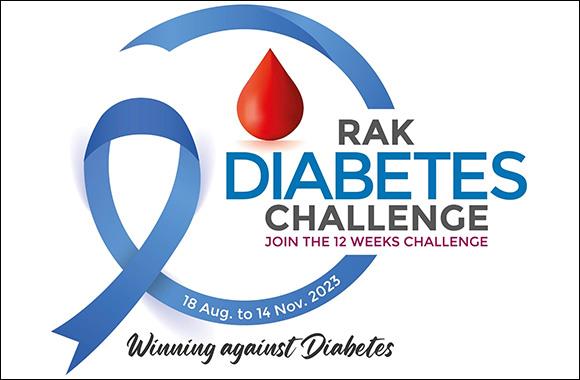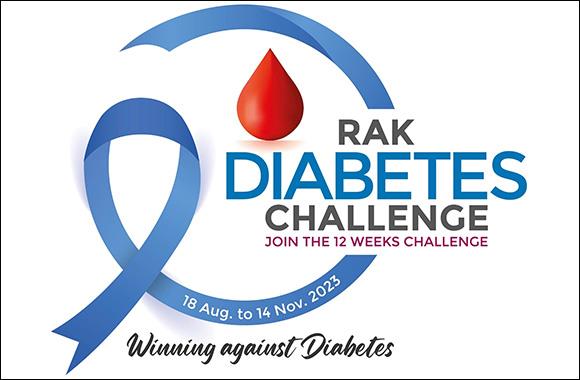(MENAFN- Dubai PR Network) RAK Hospital Webinar Unlocks the Power of Exercise in Diabetes Management

Exercise is akin to medicine in the treatment of diabetes. 30 minutes of exercise can reduce the risk of diabetes by 40%
Safety precautions and Exercise protocols for Diabetics were explained during the session
Session advised on being vigilant about the warning signs such as extreme fatigue, pain, dizziness, palpitations, fever, chest pain, or irregular heartbeat when performing exercises.
Wearing a diabetes identification bracelet is encouraged to ensure prompt medical attention in case of emergencies.
12 September 2023; Ras Al Khaimah, UAE- Exercise is now recognized as a cornerstone in the prevention, treatment, and reduction of diabetes complications. In a recent DiaBeat webinar hosted by RAK Hospital as part of its three-month Diabetes Challenge, participants gained valuable insights into the pivotal role of exercise in diabetes management. Dr. Madhurima Deshmukh, a Lifestyle Coach with Arabian Wellness and Lifestyle Management, a division of RAK Hospital, led the informative session.
Diabetes Mellitus, a global health concern characterized by abnormally high blood glucose levels, affects millions worldwide. It can lead to severe complications such as heart disease, neuropathy, retinopathy, nephropathy, and more if left unmanaged. Dr. Madhurima Deshmukh shed light on the critical link between exercise and diabetes, emphasizing its potential to enhance insulin sensitivity, promote efficient glucose metabolism, and improve overall health.
'Studies have shown that exercise plays a pivotal role in increasing insulin sensitivity, enabling more efficient blood glucose metabolism. In fact, just 30 minutes of exercise can reduce the risk of diabetes by 40%,' stated Dr. Deshmukh. 'Moreover, exercise serves as a powerful tool to manage calorie balance, reduce body fat, build muscle tone, and enhance blood circulation. It also significantly lowers the risk of heart disease, diabetic complications, and reduces stress. In essence, exercise is akin to medicine in the treatment of diabetes.'
The webinar provided practical guidance on exercise requirements for diabetics. To reduce the risk of diabetes, it was revealed that engaging in just 30 minutes of moderate-intensity aerobic activity per day for 5-6 days a week can be highly effective. Additionally, participants were encouraged to incorporate muscle-strengthening activities on at least two of these days. Non-Exercise Activity Thermogenesis (NEAT), such as everyday chores that require energy expenditure, was also discussed as a valuable contributor to fitness.
A diverse range of exercises was highlighted during the session, including stamina-building activities like brisk walking, swimming, and cycling, as well as muscle training and strengthening exercises that can be done with light weights or one's body weight through calisthenics. Furthermore, the importance of flexibility exercises involving joint mobility and stretching was underscored.
The webinar didn't stop at conventional exercises; it also advocated for the inclusion of yoga in diabetes management. Yoga's unique combination of physical exercises, mental relaxation, and breathing techniques can be highly beneficial for individuals with diabetes.
Addressing the challenges of time constraints, Dr. Deshmukh encouraged participants to embrace even brief bursts of exercise. 'If you can't find 30 minutes in your day for exercise, you can easily incorporate 5-minute sessions at home or in your workplace.'
While exercise offers myriad benefits, Dr. Deshmukh highlighted essential safety precautions for diabetics. These include obtaining medical consent from a healthcare professional, particularly for those on insulin injections. Regular monitoring of blood sugar levels before and after exercise was emphasized, with a safe range between 100 and 250 mg/dL. It was recommended to exercise one to two hours after eating, keep snacks handy to combat hypoglycemia, wear appropriate footwear to prevent injuries, and stay vigilant for warning signs such as extreme fatigue, pain, dizziness, palpitations, fever, chest pain, or irregular heartbeat. For added safety, wearing a diabetes identification bracelet was encouraged to ensure prompt medical attention in case of emergencies.





















Comments
No comment